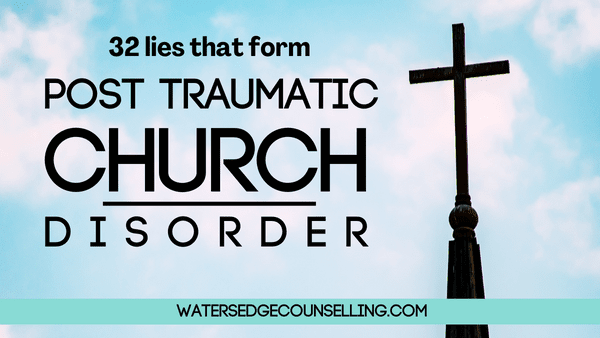
We have heard of Post Traumatic Stress Disorder, however, when we came across the term Post Traumatic Church Disorder by practitioner Richard Fay, we identified with it immediately. At Watersedge, we see many clients who practice religion, or who once chose to. Many share stories about religious trauma and are actively unpacking their relationship with the Church and their beliefs about a higher power. Practicing faith can be of great benefit to a person’s life and finding religious community can be extremely fulfilling. However, when someone experiences trauma or abuse within these systems and structures, they can become a source of pain, shame and fear. Richard has generously shared his thoughts on Post Traumatic Church Disorder with us, and listed the common lies that have harmed his client’s sense of self as they heal.
Post Traumatic Church Disorder
My background is as clergy within the church. That world did much good in me, but also a whole lot that was not good. Now as a practitioner, I see many clients who come from a religious background or whose parents or even grandparents came from a religious background, and many have Post Traumatic Church Disorder.
Here’s a list of toxic religious lies those environments typically create. As you read them, you may recognise why Judith Richards created the ‘I choose’ statements, used in the Richard Trauma Process, because these beliefs deeply damage people’s lives.
Traumatised people go to the church for answers, and often have their trauma reinforced. I am not writing this to criticise the church, but to call it to account, for it has much to account for, and to free its prisoners. Nothing good can happen unless and until these beliefs are overturned by the client’s own choices. This list of lies many people inherently believe could help you craft ‘I choose’ statements as you heal from Post Traumatic Church Disorder.
I am inherently bad.
I can’t trust myself.
My heart is wicked.
I deserve punishment.
I don’t measure up.
I am powerless.
Self-denial is holiness.
I need forgiveness for who I am.
I need to be saved from myself.
I am worthless on my own.
Being devoted to God means staying in an abusive relationship.
Therapy is a lack of faith.
Self-care is selfish.
The world is evil.
People I deeply loved who have died are in hell or will be sent there by God.
Everything outside my church culture is a threat.
I can never be good enough.
Feelings are dangerous and not trustworthy.
The desires of my body are evil, so I am evil.
An empowered person is someone doesn’t trust God and is arrogant.
To walk tall and proud is the greatest sin.
I am not capable of thinking for myself.
Obedience to external authority is true discipleship.
Questioning is a spirit of rebellion.
I must be perfect.
My struggles mean I am not trusting God.
I am nothing without Jesus.
I am weak and only he is strong.
God is masculine and feminine is less/weak.
God will fix it for me if I pray enough.
And most terrifying for many: if I challenge any of these beliefs I will lose my salvation and go to hell.
Richard Fay is a counsellor and former pastor. To find out more visit https://richardfay.com.au/